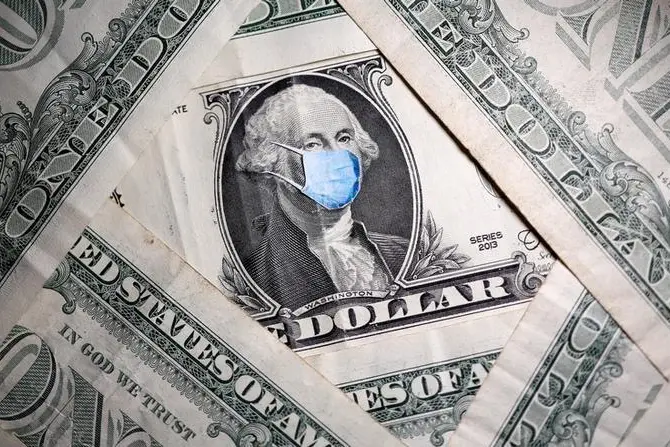PHOTO
LONDON - The dollar headed for its worst back-to-back weekly drop this year amid an extended retreat in Treasury yields as investors increasingly bought into the Federal Reserve's insistence of keeping an accommodative policy stance for a while longer.
The benchmark 10-year Treasury yield dipped to a one-month low of 1.528% overnight, moving further away from over a one-year high of 1.776% reached at the end of last month, even in the face of Thursday's stronger-than-expected retail sales and employment data.
San Francisco Fed President Mary Daly said on the same day that the U.S. economy is still far from making "substantial progress" toward the central bank's goals of 2% inflation and full employment, the bar the Fed has set for beginning to consider reducing its support for the economy.
That echoed Fed Chair Jerome Powell's comments in several speeches over the past week that policymakers will look through near-term rises in prices amid ongoing slack in the labour market.
The dollar index =USD , which tracks the greenback against six major peers, dipped to an almost one-month low of 91.487 on Thursday before steadying to 91.654 in the European session.
It's set for a 0.5% decline for the week, extending the 0.9% slide from the previous week.
The gauge, also known as the DXY, had surged with Treasury yields to an almost-five-month high at 93.439 on the final day of March, on bets that massive fiscal spending coupled with continued monetary easing will spur faster U.S. economic growth and higher inflation, particularly compared to places like Europe.
But bond and foreign-exchange markets now seem willing to give the Fed the benefit of the doubt that inflation pressure will be transitory and monetary stimulus will remain in place for years to come.
"One of the biggest perceived risks to the 2021 recovery story playing out in financial markets is a bond tantrum – or a disorderly rise in U.S. yields," ING's global head of markets and regional head of research for UK and CEE, Chris Turner said.
"Thus, it has been surprising this week to see the large decline in U.S. yields, despite above consensus U.S. CPI and retail sales."
Retail sales increased 9.8% last month, beating economists' expectations for a 5.9% rise, while first-time claims for unemployment benefits tumbled last week to the lowest level in more than a year, separate reports showed Thursday.
The dollar traded at 108.94 yen, heading for a 0.8% loss for the week, following a 0.9% decline the previous week.
"We are tempted to say that DXY made an important corrective high at 93.44 at the end of March – and is now heading for a retest of the year’s lows at 89.21," Turner said.
The euro changed hands at $1.1977, set for a 0.5% weekly advance, adding to the previous period's 1.3% surge.
Some analysts also pointed to Wall Street's strong gains, with the S&P 500 and Dow both posting record highs, as weighing on the traditionally safe-haven dollar amid increased risk appetite.
"From a cross-asset perspective, we are seeing a theme in markets, which seems similar to last year in the sense of falling real US yields, rising commodities, declining vol, strengthening equities and general dollar weakness," said Mikael Olai Milh?j, chief analyst at Danske Bank.
Highly anticipated economic data from China on Friday ultimately had little effect on currencies, even as the world's second largest economy posted record 18.3% growth in the first quarter year-on-year.
The Chinese yuan slipped 0.1% to 6.5230 per dollar in the offshore market.
In cryptocurrencies, Bitcoin stood around $61,583, below the record high of $64,895 reached on Wednesday, when cryptocurrency platform Coinbase COIN.O made its debut in Nasdaq in a direct listing.
(Reporting by Ritvik Carvalho; additional reporting by Kevin Buckland in Tokyo; Editing by Simon Cameron-Moore) ((Ritvik.Carvalho@thomsonreuters.com; +44 2075429406; Reuters Messaging: ritvik.carvalho.thomsonreuters@reuters.net; Twitter @ritvikcarvalho))





















